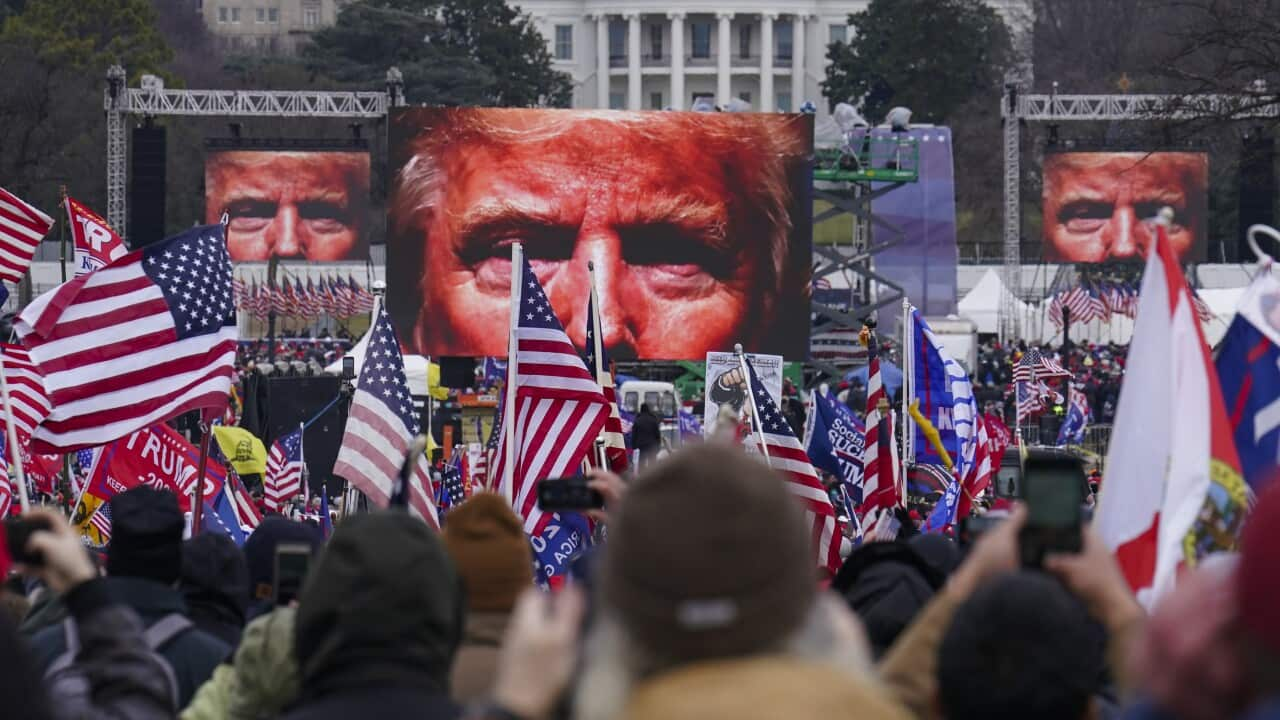The results of the 2024 United States presidential election — won by republican candidate Donald Trump — have been certified by Congress on Monday local time.
It was during this process four years ago that Trump’s supporters violently stormed the US Capitol, in what was later described as an insurrection by some, and an attempted coup by others.
The invasion of the US House of Representatives and Senate resulted in five deaths, over US$2.8 million ($4.49 million) in damages, and more than 1,500 people being charged with offences.
Donald Trump was indicted for his role in the Capitol Riot, but the case has been dropped. Source: AAP / Sue Ogrocki/AP
What happened in the Capitol riot?
Trump was defeated by Democrat Joe Biden in the 2020 US election but didn’t accept the result and, without providing evidence, repeatedly claimed the election had been “stolen”.
In a post on X in December of that year, Trump announced a rally would be held on 6 January, while votes were being certified, saying it was “statistically impossible” that he had lost the election.
“Be there, will be wild!” he wrote.
Addressing the crowd near the White House on the day, Trump repeated his allegations of voter fraud and election rigging. A mob then broke down barricades outside the Capitol building and swarmed inside.
They rampaged across legislative floors and through offices in an attempt to stop a joint sitting of Congress that was formalising Biden’s victory.
Police officers were beaten, offices were vandalised and looted, and many politicians hid or were evacuated.
The cost of damage from the siege is estimated to be over US$2.8 million ($4.49 million), and 1,561 people have been charged for their involvement.
In November 2024, he was elected president again. Later that month prosecutors dropped the case.
How did the Capitol Riot impact the US?
John Hart, a specialist in American government and member of the Emeritus Faculty at the Australian National University, said the riot had been a “major setback” for the rule of law in the US.
“Even though a large number of the participants in the storming of Congress have been prosecuted and given jail sentences, Trump himself has completely evaded the legal process,” Hart said.
The Capitol Riot led to significant damages, injuries, arrests, and even deaths. Source: SBS News
“Technically, (the indictment) could be revived in four years time when Trump leaves the presidency, but that’s very unlikely … it’s a major setback over the last four years; it’s all worked to Trump’s favour.”
Hart said he believes the riot and its aftermath has also “added to extreme polarisation” in US politics.
Brendon O’Connor, a professor of US politics and foreign relations at the University of Sydney, said he believes the biggest impact of the riot was a wider proliferation of election denialism and distrust of established facts.
Trump’s repeated claims of voter fraud had formed the basis of his supporters going to Washington and taking violent action, he said.
“You can say whatever you want now in politics, and Donald Trump clearly got away with that,” he said.
“As much as of storming of the Capitol and the police that were injured that day and the sense of kind of chaos that created and the sense of things being somewhat out of control for a few hours, the broader context is probably the most significant.”
Will Trump supporters be pardoned over the Capitol riot?
When Trump is sworn in as president, he will be granted executive powers, including the
During the campaign, Trump indicated that if re-elected he would pardon those who had been charged for their involvement in the riot.
In an interview with NBC News in December, he was asked whether he would follow through with this.
“We’re looking at it right now. Most likely, yeah,” he said.
Right-wing extremists and supporters of Donald Trump stormed the US Capitol on 6 January, 2021. Source: AAP / Julio Cortez/AP
“Those people have suffered long and hard. And there may be some exceptions to it. I have to look.”
In an interview with Time Magazine after that publication named Trump as he reiterated his plans.
“I’m going to do case-by-case, and if they were non-violent, I think they’ve been greatly punished. And the answer is I will be doing that, yeah, I’m going to look if there’s some that really were out of control,” he said.
“Well, we’re going to look at each individual case, and we’re going to do it very quickly, and it’s going to start in the first hour that I get into office. And a vast majority of them should not be in jail.”
Could it happen again?
Hart said that, in the current political landscape, it’s possible that similar incidents could happen again.
“When Trump first appeared on the national scene in a political capacity, I would never have dreamt that this would’ve happened … nor would most people,” Hart said.
“Could it happen again? Yes, I guess it could, because the American constitution is a lot weaker than many observers thought in its ability to check and balance power in the system to hold rulers accountable.”
“I think a certain degree of civil order has been broken down,” he said.
“And the lack of consequences to Trump’s election denialism, and support for the January 6 rioters … probably is kind of encouraging other politicians to try this on in the future.”



